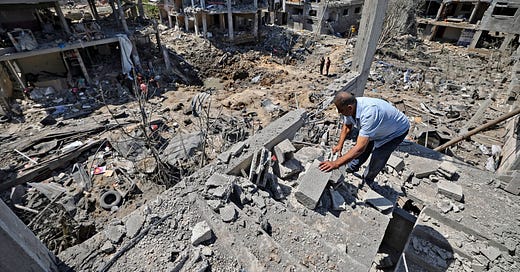Israel's demand yesterday, instructing 1.1 million residents of the Gaza Strip to evacuate within a 24-hour window or face severe consequences in their bid to eliminate Hamas, has triggered a wave of international concern.
With the clock ticking down, the move not only raises the spectre of a humanitarian crisis, but also alarms about broader implications globally.
When set against the backdrop of Jewish history, particularly the horrors faced during the Holocaust, this directive appears fraught with bitter ironies.
The logistical nightmare of relocating close to 2million people in such a short period poses an enormous challenge.
Where would the men, women and children who have been occupants of the Gaza Strip seek refuge?
Adjacent countries like Egypt, who appear to have closed its borders, Syria, Lebanon, Oman, Qatar, Jordan, and others are scarcely prepared for such an influx – Lebanon has its problems economically and politically.
Moreover, vulnerable groups like the elderly, infirmed, and children are also most at risk.
Beyond the looming threat of military action, the sheer displacement is more than likely to spell disaster due to food shortages, shelter, medical facilities, and sanitation.
Internationally, Israel’s directive to evacuate, not only exacerbates regional tensions, but also have far-reaching geopolitical implications.
With the Middle East now perched on the precipice of a full-blown military war that will destabilise the entire region, the likelihood should Israel and Prime Minister Benjamin Netanayhu’s threat to annihilate the Gaza Strip, will more than likely spark a severe backlash from neighbouring Arab countries.
Furthermore, Israel’s action will compel other global powers and institutions to reassess their diplomatic stances regarding Israel, leading to a straining of relations or even sanctions.
The Jewish people's historical memory is indelibly marked by the horrors of the Holocaust.
Under Hitler's reign, millions faced persecution, displacement, and eventual extermination.
The painful episode, still vivid in collective memory, is a haunting reminder of the human cost of intolerance and hatred.
It's against this sombre historical backdrop that Israel's directive becomes even more perplexing.
One could assume the Jewish state, forged in the aftermath of such an unprecedented tragedy, would exhibit heightened empathy towards another marginalized group's aspirations and sufferings.
Yet, the current scenario suggests a more complex interplay of historical trauma, existential anxieties, and geopolitical strategies.
Netanyahu's actions, while rooted in security concerns and nationalistic fervour, draw uneasy parallels to oppressive regimes of the past.
It’s important to tread cautiously when making such comparisons.
The scale, intent, and context of the Holocaust were unique, and while there are undeniable similarities in the dynamics of displacement, it's important to recognise the differences in the geopolitical landscapes of then and now.
Israel's rationale revolves around neutralising Hamas, viewed by many as a threat to its very existence. Yet, the broader ethical and humanitarian considerations of such a move remain in question.
Can the elimination of a perceived threat justify potential large-scale displacement or worse?
The historical weight of Jewish suffering makes the present directive even more perplexing.
If any group understands the profound human cost of forced relocations and persecution, it should be the Jews - lending a unique responsibility to Israel, as a state and society, to be more compassionate and act with considered restraint.
In the face of extreme circumstances, whether for a human or any creature, constrained in the shadows without a glimmer of illumination, inevitably resorts to irrationality seeking liberation from the constricting fetter.
The current situation in Gaza underscores the broader complexities of the Israel-Palestine conflict, where historical wounds, territorial disputes, and existential fears converge.
As the international community grapples with its response, a balanced perspective is paramount. Recognising Israel's security concerns while empathising with the Palestinians' plight is essential.
Drawing lessons from the past, especially the Holocaust, can serve as a moral compass.
It's a powerful reminder of humanity's capacity for both cruelty and resilience.





International community responded that is standing with Israel. I do have question, what is the end result? 2.3 million of Palestinians will not be able to continue living in Gaza Strip so where they going to settle them?